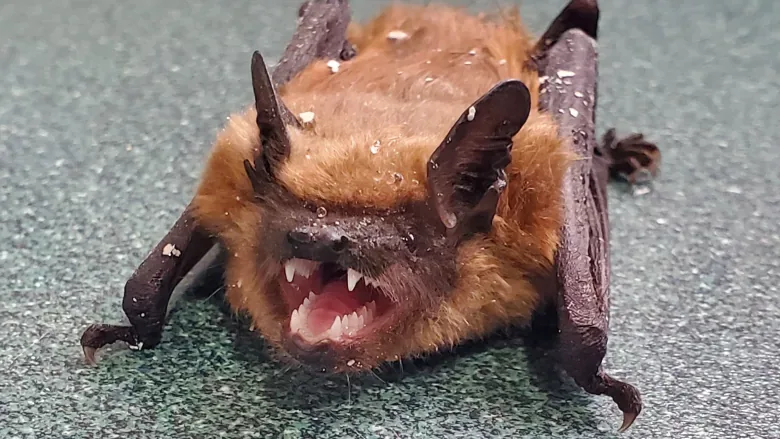
More big brown bats showing up in N.B. — and moving into people's homes
Laundry day started out as usual for Kaushalya Rathnayake and his wife Ilesha Ileperuma Arachchi on Sunday. They started the washer, but then noticed something was in the laundry sink.
It was a bat, later identified as a big brown bat. But they weren't scared. In fact, they jumped into action. They're working on their PhDs in biology at the University of New Brunswick and are not easily rattled by wildlife.
Rathnayake said they didn't have any gloves so they grabbed some scrap paper from the garbage can and tried to fish the bat out of the drain before it filled with water from the washing machine.
"We saw that he was in distress," said Rathnayake. "And with time he was quite OK and he started moving … so we knew that it was going to survive."
As it turns out, it's not unusual to find these bats indoors.
Big brown bat numbers go up as other bat populations go down
Donald McAlpine, the curator of zoology at the New Brunswick Museum, said big brown bats are common throughout North America, but were rare in New Brunswick from the 1950s until around the 1980-90s when their numbers started increasing, possibly because of the warming climate.
McAlpine said it is also possible that because other bat populations have decreased, there may be less competition for big brown bats to overwinter or hibernate. McAlpine said New Brunswick has lost over 99 per cent of their overwintering bat population.

Kaushalya Rathnayake and his wife Ilesha Ileperuma Arachchi noticed a bat in their apartment building's laundry room sink and used pieces of paper to lift it out. They later set it free. (Submitted by Kaushalya Rathnayake)
Certain threats, like the white-nose fungus that has decimated some bat populations in the province, has not affected big brown bats to the same degree, said McAlpine. He said bats affected by white-nose fungus tend to be smaller species.
Until around two years ago, McAlpine said there were no records of bats overwintering in caves or abandoned mines because of New Brunswick's latitude. Instead, they were all staying in heated homes, which McAlpine said is common at higher latitudes.
McAlpine said big brown bats, especially in the southern third of the province, tend to overwinter in attic areas or under the eaves where there's some heat, but it isn't hot enough that it will burn off their fat reserve for hibernation.
"Because big browns are also able to tolerate somewhat lower temperatures than some of the other bats, they will sometimes move between hibernation sites during the winter," said McAlpine. "Perhaps the conditions later in the winter are not quite right, [so] they'll find another house to move into."
Overwintering reports increase
He said prior to 2000, it was unusual to get reports of big brown bats overwintering in homes, but now, they get around a dozen reports each winter.

Donald McAlpine, the curator of zoology at the New Brunswick Museum, said big brown bats are common throughout North America, but were rare in New Brunswick from the 1950s until around the 1980-90s when their numbers started increasing. (Brian Chisholm/CBC)
But McAlpine said most people aren't aware if there's a big brown bat overwintering in their home unless it moves into the living space, which he said would normally happen when bats have low fat reserves or the hibernation site isn't ideal.
He said if a bat does go into the living space and it's very cold outside, there's not a whole lot you can do. He said you can try moving the bat outside during the day when the temperature is warmer in the hope that the bat will find a new place to overwinter.
If the bat comes into contact with humans or pets, then McAlpine said there's a concern of rabies, so the Department of Natural Resources would need to be contacted.
SEE ALSO: Large hibernating bat colony found living in Saskatchewan curling rink
Won't bite without provocation
Rathnayake said for the most part, bats won't bite unless they're provoked. He said when he found the bat in his sink, he tried to hold it by the back of its neck, "like you're handling a little kitten."
The bat tried to bite his finger because it was stressed, but he said by then he had his winter gloves on, so there was no contact with his skin.
After making sure the bat was OK, he put it in a cardboard box and took it to an open window. And after a while, the bat flew away.
"I don't expect him to come back," said Rathnayake. "This place is not a good place for him to overwinter, but maybe he might find a place."
This article, written by Hannah Rudderham was originally published for CBC News. With files from Information Morning Fredericton.










